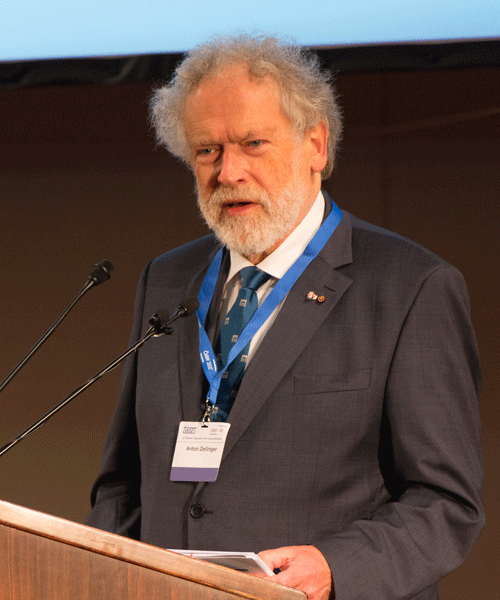Anton Zeilinger, John Clauser and Alain Aspect have each conducted groundbreaking experiments using entangled quantum states, where two particles behave like a single unit even when they are separated. The Royal Swedish Academy of Sciences awarded these three scientists the 2022 Nobel Prize in Physics “for their experiments with entangled photons, establishing the violation of Bell inequalities and pioneering quantum information science."
A TWAS fellow since 2014, Anton Zeilinger is a quantum physicist at the University of Vienna, Austria, a former President of the Austrian Academy of Sciences (ÖAW) and a member of other illustrious academies, including the German National Academy of Sciences, Leopoldina.
Zeilinger is a pioneer in quantum physics—the study of matter and energy at the most fundamental level—and its applications to quantum information technology, a rapidly-emerging technology that harnesses the laws of quantum mechanics to solve problems too complex for conventional computers. In fact, the field of quantum information is among the most promising in science today: acting at the atomic and subatomic levels, its applications include not only secure encrypted communication, but also simulation of physical systems, finance, materials science and healthcare.
Among other things, his research group has demonstrated a phenomenon called quantum teleportation, which makes it possible to move a quantum state from one particle to another one at a distance.
“We all know teleportation from [the science fiction TV show] Star Trek and so on, where somebody’s transported. Teleportation in quantum physics is somewhat different,” he told Nobel Prize Outreach.
In quantum physics, Zeilinger explained, teleportation is “a transfer of information from one object to another one without actually knowing the information.”
“This is one of the basics of how future quantum computers can talk to each other,” he added.
Zeilinger's ties with TWAS are strong: he played a key role in the hosting and organization of the TWAS 13th General Conference and 26th General Meeting, held in Vienna from 18 to 21 November 2015, when he was the President of ÖAW.
"We considered the invitation from the Austrian Academy of Sciences, and from our friend Prof. Zeilinger, to host the Meeting to be an important recognition of TWAS's growing role in helping to bridge the gap between the developing and the developed world," recalled TWAS Executive Director Romain Murenzi. "During his tenure as ÖAW President, Zeilinger himself was very supportive of our mission and activities, and his professional career clearly shows his dedication to fostering scientific cooperation at the international level.”
“As highlighted in our current strategic plan, we want to make the advances of science and technology available to all, in every corner of the world,” Murenzi added. “This includes advances in quantum cryptography, one of the fastest-growing areas in quantum information science. Therefore, we look forward to working with Prof. Zeilinger in the years ahead, to build scientific capacity in this field, especially in the global South.”
"Anton Zeilinger is a world-renowned scientist and a good friend to TWAS," emphasized Mohamed A. Hassan, TWAS President, President of the Sudanese National Academy of Sciences, Chairman of the UN Technology Bank for the Least Developed Countries and former Chairman of the Council of the United Nations University. "As such, he is naturally close to the Academy's mission, which includes promoting science and technology in developing countries and acting in line with the UN Sustainable Development Goals to eliminate poverty, and hunger, promoting higher education and gender equality."
But Zeilinger is also an incredibly prolific scientist who always dared to explore uncharted territories of physics, Hassan added.
"This most important international recognition in physics is truly deserved: the potential implications of his discovery, so far mostly unexplored, will impact not only physics but other fields as well, bringing clear benefits also to the global South by creating more jobs and propelling the developing countries towards the international scene."
Cristina Serra

